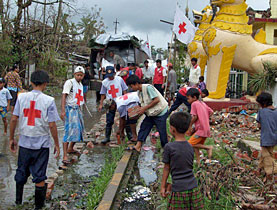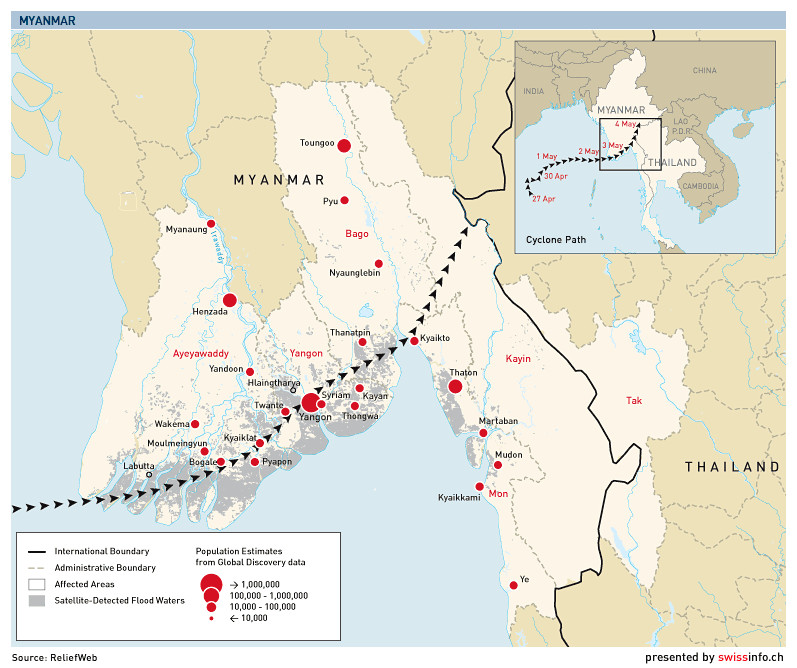Myanmar aid decision draws muted response

Swiss relief organisations have given a cautious welcome to the decision to allow international aid workers into Myanmar.
Myanmar’s ruling junta leader Senior General Than Shwe agreed to allow all humanitarian workers into the country after meeting with the United Nations Secretary-General Ban Ki-moon on Friday.
The Swiss Red Cross told swissinfo it was “good news in principle” and the Swiss Agency for Development and Cooperation (SDC) said it would wait for more confirmation before acting further.
To date Myanmar’s military government has refused to allow an unrestricted flow of foreign aid and experts through its borders.
Cyclone Nargis struck the country on May 2, killing at least 78,000 people, according to government figures. Another 58,000 are missing and around 2.5 million people have been left homeless and without access to clean water, food or health care.
Some international aid has filtered through since the scheduling of Friday’s talks between the UN and junta. Ten UN helicopters have arrived and the Doctors Without Borders organisation says it has foreign staff working in the hard-hit Irrawaddy delta.
UN agencies say they are ready to step up relief, but speaking after his meeting Ban said application of the junta’s decision would be “key”, a cautious line echoed by Swiss organisations.
Wary
“We have to see if these promises are translated into actions,” Swiss Red Cross spokesman Karl Schuler told swissinfo.
The organisation has three experts in Bangkok waiting for Myanmar entry visas. Contributions totaling SFr500,000 ($484,700) have been sent from Switzerland, along with 25 tons of vital supplies such as blankets and mosquito nets.
Once there is confirmation that all humanitarian workers and relief will be allowed into the country, the volume of Swiss Red Cross aid will increase and a new appeal for funds will be launched.
“We hope that humanitarian organisations can really start work in Myanmar. If aid efforts remain impossible, it’s clear that there will be a second catastrophe,” added Schuler.
“It’s a very decisive moment for the population to be really provided with international aid. [But] this decision comes too late for many people, especially those who have been injured and who probably didn’t have any adequate medical aid.”
Challenges
The Red Cross says the main priorities now are providing drinking water and shelter.
“Emergency health units are ready, water and sanitation units, all are ready to be distributed. If it is opened up to international personnel, a major relief operation will begin. Once they are there things can move very quickly,” explained Schuler.
Their main challenges will be overcoming problems such as a lack of vehicles and access beyond blocked roads or bridges that have been destroyed.
For its part, the SDC will wait for more confirmation that international aid is being allowed in and draw up plans based on the outcome of a donor conference in the former Myanmar capital, Yangon, on Sunday.
Fabienne Wydler, SDC spokeswoman, said it was unclear what the agency would be able to contribute.
“We will be trying to negotiate access to the victims and want to see whether we will have control over distribution of goods, for example,” she explained.
“The problems are still with the roads and bridges which have been destroyed. Apart from that we still need visas to go to the most-affected areas, but we don’t know if that is going to change.”
UN head Ban, who has toured some of the affected areas and will attend the donor conference, warned that more must be done. “The world is watching,” he said.
swissinfo, Jessica Dacey
A donor conference is being held in Yangon in Myanmar on Sunday to support victims of the Nargis cyclone. It was organised jointly by the UN and Association of Southeast Asian Nations (ASEAN), of which Myanmar is a member.
Myanmar’s ruling military junta is asking for more than $11 billion (SFr11.35 billion). Switzerland has already committed SFr2.5 million for victims, SFr1 million of which went to the World Food Programme.
At the conference, Switzerland will examine providing additional aid to Myanmar. A spokeswoman said they would need to ensure supplies reached victims.
The Swiss public is being invited to donate money via the Swiss Solidarity Foundation, which has raised SFr3 million so far.
Myanmar, formerly Burma, has been under military rule since 1962.
A massive hike in fuel prices last September sparked almost two weeks of sustained popular protest, which were halted when police and soldiers opened fire on demonstrators.
The UN says the junta is also holding more than 1,100 political prisoners.
Nobel peace laureate and opposition leader Aung San Suu Kyi has been under house arrest for 11 of the past 17 years. ICRC staff have not visited her since September 2003.
The ruling military junta announced on May 15 that it had won overwhelming approval in a referendum on a constitution enshrining its grip on power.


In compliance with the JTI standards
More: SWI swissinfo.ch certified by the Journalism Trust Initiative












You can find an overview of ongoing debates with our journalists here . Please join us!
If you want to start a conversation about a topic raised in this article or want to report factual errors, email us at english@swissinfo.ch.